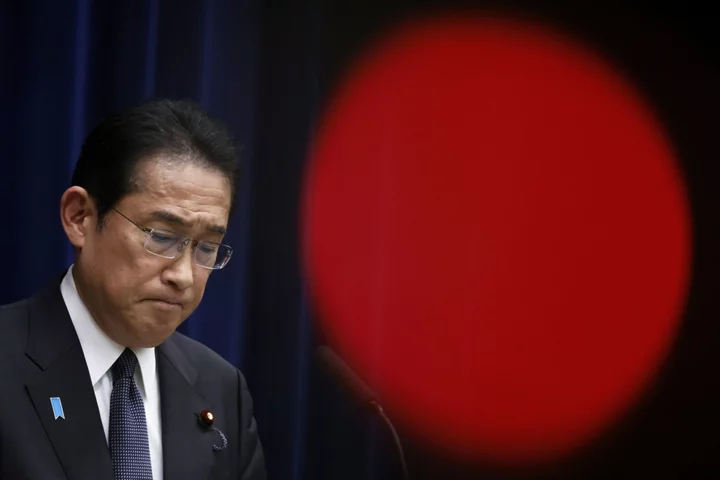Support for Japanese Prime Minister Fumio Kishida continued to slide in the first polls published after he announced tax rebates and handouts to help ease the impact of inflation.
A survey by the Nikkei newspaper Oct. 27-29 found approval had slumped by 9 percentage points from last month to 33%, while a poll by broadcast news network ANN found support was down to 26.9%. Both marked the lowest since he took office two years ago.
Perceptions that Kishida hasn’t done enough to shield voters from the effects of inflation have continued to weigh on his support even as he touts stimulus measures aimed at helping households. While no general election need be called until 2025, his unpopularity could prompt rival factions within his long-ruling Liberal Democratic Party to seek to replace him as leader.
READ: Japan’s Kishida Touts Tax Cuts After Special Election Loss
Data show that real wages for full-time employees have fallen as pay increases fail to keep pace with rising prices. Voters see inflation as the most important issue for the government to tackle, according to the Nikkei and other polls.
“I want pay rises next year that aren’t overtaken by price rises,” Kishida told TV Tokyo in an Oct. 24 interview. “At this point they haven’t caught up, so we have to prepare some support for people’s daily lives.”
Kishida has also laid out plans for a ¥40,000 ($267) tax rebate next summer, as well as ¥70,000 handouts by the end of the year for low-income households. That adds to an extension through the spring of subsidies on gasoline and utilities. Full details of a plan to bolster the economy are set to be revealed Nov. 2.
Almost two-thirds of respondents to the Nikkei poll said they didn’t approve of the planned tax cuts. Some 56% of respondents to the ANN poll also disapproved, with 42% of them saying they saw the move as merely a bid to bolster support for his government and 26% citing concerns about the country’s fiscal health.
Last week, Kishida denied in parliament that there was any contradiction between his efforts to combat inflation with subsidies and the Bank of Japan’s ultra-easy monetary policy, which has weakened the yen, making imported fuel and food more expensive.
Consumer price growth in Tokyo — a leading indicator for the national data — unexpectedly quickened for the first time in four months in October. The surprise will add to pressure on BOJ board members to raise their forecasts for consumer inflation for this year and next during a two-day meeting that concludes on Tuesday.
The existing gas and electricity subsidies alone helped shave 0.98 percentage point off overall inflation, according to government data, while the gasoline subsidy is also helping to hold down inflation.

